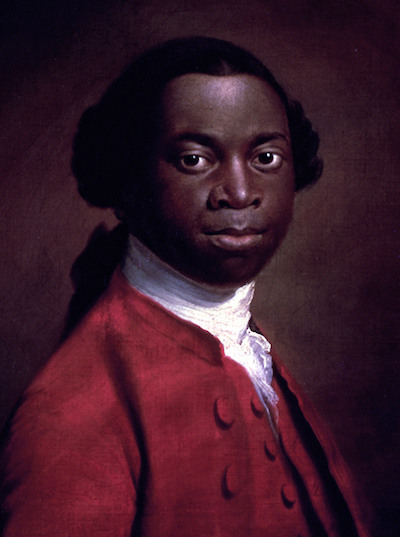Or, to give it's full title: The Interesting Narrative of the Life of Olaudah Equiano, or Gustavus Vassa, the African. Written by HimselfI read a modern edition, but you can get an early edition text from Project Gutenberg
I picked this up at a used bookshop due to the title; I am always on the lookout for interesting narratives. Thankfully, "The Interesting Narrative" is not just puffery, this was one of the more fascinating reads of the last year.

Olaudah EquianoOlaudah Equiano was born in what is now Nigeria in 1745. A bright and curious child, he had a happy childhood until he was kidnapped with his sister and sold to a wealthy chieftain. To cut a long story short, he eventually was taken to the coast and sold into the triangle trade. After a horrendous voyage he was resold again in Barbados. He ended up owned by a lieutenant in the British royal navy and he spends most of the following years aboard various ships, where he learns English and is exposed to the wilder world.
His owner eventually sold him on and Equiano ended up back in the West Indies, seeing the full brutality of the plantantions there. Due to extreme good fortune and his own talents, Equiano managed to buy himself out of slavery and go into business for himself, ending up back in London where, near the end of his life, he campaigned against the institution of slavery, writing The Interesting Narrative in the process. The British abolished slavery a few years after Equiano died.
The previous summery does not really to Equiano or his book justice. Read strictly as a novel, it is a rip-roaring tale of adventure and overcoming adversary with a satisfyingly fitting ending. Read as a travelogue, it is a collection of fantastic sights and incidents seen through the eyes of one born outside of the European tradition.
Equiano is not an introspective narrator, writing about each indignity with resignation. I guess if you get betrayed by people you counted on, cheated, or beaten up as many times as Equiano did, you become a little detached. Instead of expressing anger or misery at his condition, Equiano instead uses the book to describe his wonder at the culture and knowledge he was exposed to. He is particularly enamored with Christianity, enthusiastically converting while wryly observing the less-than-christian behaviour of his fellow men.
But The Interesting Narrative is also written as a strong denouncement of slavery and has answers to those who would defend the practice. A common theme running through the story is that those who profit from slavery become debased and corrupted themselves. Even the masters that treated Equiano "well" overworked and underfed him to extract maximum profit, and there are some heartbreaking moments. Despite these setbacks Equiano was incredibly lucky compared to the other slaves he encountered, whose indignities are vividly described.
Equiano makes a strong distinction between the slavery practiced in his native Africa and the Americas. Although he was already a slave before he was traded to Europeans, he was treated much better in Africa and was almost part of the family who owned him. The idea that Africans were better off as slaves is demolished by examples and by the lengthy and longing descriptions of Equiano's childhood. Equiano's first-hand accounts of being both a slave and briefly being part-owner of a slaving plantation provide ample ammunition for opponents of the slave trade while slamming the door on the political and economic arguments for slavery that existed at the time.
Succeeding as an action adventure, a redemption tale, a political work, and as a slice of life, The Interesting Narrative of the Life of Olaudah Equiano, or Gustavus Vassa, the African. Written by Himself is worthy of its name.
Highly recommended.